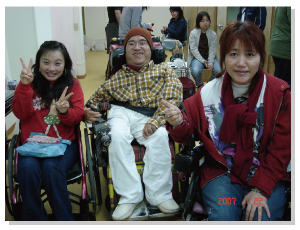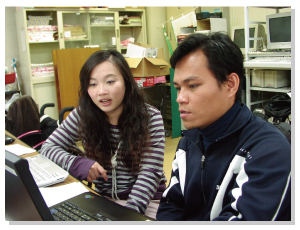- HOME
- Alumni News
- Cai Shu Fan (8th trainee)
- Maruko's Final Report
Maruko's Final Report
Final Report
Japanese Language Training
I arrived in Japan on September 1, 2006 and spent three months studying Japanese. It was the first time that I had such fun studying, everyday with other delightful trainee friends and a team of teachers who all had different personalities. It was a lot of fun and a great learning opportunity. However, even though I enjoyed studying with the other trainees, I wanted to go onto learning something more challenging, so I went onto a Japanese language school on my own. At the school, I studied conversation, kanji and writing essays, and gradually my Japanese improved. It was fun to go to class every day.
Individual Training
1.Non Profit Organization Center for Independent Living ‘Iruka Okinawa’
For my individual training, I went to Non Profit Organization Center for Independent Living ‘Iruka Okinawa’ in Okinawa. My Japanese was not up to par yet and without the other trainees or the JSRPD staff, I felt quite nervous to be there on my own. Every day I was busy in Okinawa. I visited schools for special needs education, facilities and observed interactions between users, and understood why independent living was so important. On my days off, the staff of Iruka Okinawa took me to the Iejima Island, Okinawa Churaumi Aquarium and the International Street (known as Kokusai-Dori), to show me some of the Okinawan culture. I was sad when the training period ended. I received many gifts from everyone. Taiwan and Okinawa are geographically very close, so I would like to revisit the center in the future if time permits.
2.Center for Independent Living ‘Higashiyamato’
I learned a lot by talking to Ms Tabuchi and Ms Ebihara. I learned a lot that I did not know before, including many welfare systems, and laws and history concerning people with disabilities. I also learned a little about care for the elderly. Ms Tabuchi has spinal cord injury like me. I learned something by going to Tokyo Disneyland with Ms Tabuchi’s two sons and by staying at their house. That, even if you have disability, you can still be a good mother.
3.Independent Living ‘MUCHU’ Center
I went to Independent Living ‘MUCHU’ Center in Osaka. Beforehand, I was always thinking, ‘will I manage alright on my own?’ and often remained sleepless, tensed up. But Mr. Hirashita told me ‘you are not alone, we are with you.’- I felt relieved, and it made me understand the importance of having friends.
While at the Muchu Center, we went to the Universal Studios Japan. The staff there told Mr Suyama that he could not go on the new ride. So he discussed this with the staff for about 20 minutes. It was then, that I realized that play was also important. In Taiwan, I had always thought that people with disabilities could never go anywhere or use any public transport and I had given it all up myself. I never gave myself a chance to think ‘why’ it was not possible to do these things. If everyone thought the way I did, the society will never change, no doubt. The society will change only when people with disabilities go out and are seen and recognized by others. So, play is a form of disability movement; I played a lot during the training. I also visited Osaka Castle and Tsutenkaku (A famous tower in Osaka), played bowling and did wheelchair dancing. I also went to the opening game of Hanshin Tigers and watched soccer games. It was great fun.
4.NPO. Co. Rokuseikai Hamamatsu Workshop with the Disabled-WITH
WITH, an NPO in Hamamatsu, is a workshop created for people with visual impairment, and for people with both visual and intellectual disabilities. As I wanted to learn about visual, intellectual and hearing disabilities, I decided to go there. I made white canes and studied a little about Braille. As I interacted with everyone, I learned more about the feelings of people with intellectual disabilities, and about how to support them. WITH had such a warm atmosphere.
5.Human Care Association
At Human Care Association, we summed up the training. The best thing that happened there was that I grew to like peer counseling. Previously, I could not express my feelings very well through peer counseling, but this time I managed to speak my mind a lot better. Perhaps because I had become more open. It was a great learning opportunity.

Other Activities
1.Ski training
We went skiing in January to Niigata. I got on a special set of skis called ‘bi-ski’ and followed the teacher’s instructions. The landscape was beautiful at the ski piste. There were many areas to ski, it was also incredibly fast to ski down, and a lot of fun. I skied down the slope many times in the fluffy powder snow, not feeling tired for a second. I wanted to ski much longer. It was such a great experience.
2.Home Stay
I experienced home stay in Gifu. On the way to Gifu, I saw snow from the window of the Shinkansen (bullet train). It made me very happy. I had seen snow before, but I had never seen snow falling. I had also only seen the entire ground covered in snow only on TV and in books, so it was extremely exciting.
On December 31, I had dinner and watched TV with my host family, and at 11.30pm we had noodles. Japanese people traditionally eat noodles on New Year’s Eve. Then we paid a visit to a temple. It was a bit inconvenient to move around the temple in the wheelchair, so the father helped me out. December 31st in Taiwan is extremely festive. There are fireworks, concerts and parties at night. It was the first time in my life, to go to a temple on December 31st.
My host family showed me many places. I am sure it must have been a lot of work for the father, as he had to mount the wheelchair in the back of the car every time I went back to the car. The two sisters and the father came to see me off at the station on the day I went back to Tokyo. I felt very sad to say goodbye.
How I Changed in Japan
The thing that has changed most about me since I came to Japan is that I have become stronger. My mind and my way of thinking are both much stronger. In Taiwan, I gave up everything, thinking ‘I cannot go anywhere because of my disability’ or ‘I cannot do anything’ and never really gave much thought to ‘why’ I thought I could not do anything or go anywhere. I thought that people with disabilities could never work, get married, let alone enjoy life. But now I know better. I know my rights, I like myself, and I am confident. I realized that there are many things I CAN do, and I now enjoy life. Ever since I became people with disabilities, my life has in fact become a lot luckier.

What I Would Like to Do Back in Taiwan
1.Establish a center for independent living
In Japan, I attended training programs at five centers for independent living. I met many people with severe disabilities and understood that it is possible to enjoy life even if one has a disability. By living independently, one can do whatever one wishes to do, using a personal assistant. That gives one confidence and it also leads to a number of possibilities like marriage and job. It also gives one many dreams and changes one’s life. For this reason I would like to establish a center for independent living in Taiwan, and work hard to help change the lives of people with disabilities in Taiwan.
2.Create a network for people with disabilities
I am from Taiwan. In Taiwan, we have very few opportunities for international exchange and therefore we do not have enough information. I would like to create a network for people with disabilities and organize large-scale international seminars and events every year.
3.Students services
In Taiwan, universities have student support services and I received their service for about three years. But it was always the same group of people who helped me, and it made me feel guilty to always have to depend on the same people. When I am back in Taiwan, I would like to support students with disabilities by a system like the personal assistance system I witnessed in Japan.
A Word of Thanks
Thank you so much to everyone at the Duskin Ainowa Foundation and Japanese Society for Rehabilitation of Persons with Disabilities, and everyone at all of the centers, who helped me out during the last 10 months. I will work hard back in Taiwan.




